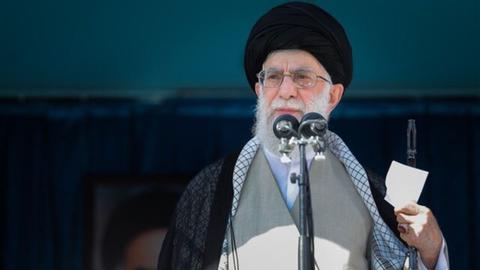Supreme Leader Ayatollah Khamenei led Friday prayers on January 17 for the first time in eight years, sending a strong message to both Iranians and world that he commands absolute power over the Islamic Republic and its people.
"We will not make any reforms and there will be no revolution,” he told the crowd. "We will not negotiate and there will be no war.”
Khamenei’s show of strength followed a tumultuous two weeks and some of the most dramatic unrest the country has seen in years, and was a clear effort to boost the morale of his supporters and the regime. His words signaled that nothing was going to change — and even if he did have plans for a few reforms, he was not going to use this particular platform to announce them. On a domestic level, his remarks will be taken very seriously. From a foreign policy perspective, however, it is consistent with a strategic habit favored by the regime when it has faced serious challenges.
During the prayers, Khamenei described the funeral of Ghasem Soleimani as "ammunition" for the Revolutionary Guards to fire missiles at the US base in Iraq. The funeral also provided an opportunity for Khamenei to justify the decision to shoot at protesters and attack those people who had criticized the regime for the Guards’ shooting down of the Ukrainian airline — some of them ripped up photographs of the Quds commander. However, authorities said these anti-regime protesters numbered only a hundred and said "tens of millions of people” attended Soleimani's funeral.
Prior to Friday prayers, some people predicted that the Supreme Leader would speak as he had done on June 5, 2009 following the disputed 2009 presidential elections and the protests it sparked. In 1999, the Supreme Leader made a speech that many said resembled a last resort in his efforts to end the protests. However, this year, as in 2009, the ayatollah’s speech does not necessarily mean the end of the protests. And yet it will still bolster his supporters, renewing their energy to take action against protests.
Khamenei refused to show solidarity with people mourning those Iranians who had died after the Revolutionary Guards accidentally shot down at the passenger plane, saying they had been "influenced by foreign media." In fact, he didn’t condemn the Guards’ commanders for their mistake, and actually thanked them. Unlike in 1999, when he conceded some responsibility for the serial killings of that year, known as the Chain Murders, during his speech on January 17, he accepted no responsibility for what had happened on January 6, when the plane was shot down. The difference is that in 1999 he could say the killings were linked to infiltration from agents of Israel and America. This time, however, blaming Iran’s enemies and accusing them of infiltration would have a different outcome.
Khamenei’s remarks about the Guards shooting down a passenger plane resembled those of Mohammad Sadeq Kushki and Nader Talebzadeh, which were broadcast on television.
Talebzadeh said that if "10 other passenger planes crashed because of a mistake, that is nothing compared to the attack on the US base," and the Leader most likely agrees with this view.
He called the protesters "followers of British television and American radio" trying to "make up" the plane crash story so that news of the Iranian missile attack on the US base and Ghasem Soleimani's funeral was forgotten.
In his address during Friday prayers, the leader of the Islamic Republic did not say anything new about foreign affairs. The day before his speech, President Hassan Rouhani had said that he could not see a way of solving the country’s economic problems while external tensions persisted. Some commentators have argued that Rouhani said this in anticipation of the Leader’s comments.
In his speech, Ayatollah Khamenei emphasized the idea of the so-called “resistance economy” and did not give any sort of green light to end the conflict with the United States or show "heroic softening."
He also took the opportunity to attack European countries, and said: "After the United States left the JCPOA [nuclear deal], I said I don't trust these countries and they will serve the United States."
Meanwhile, Khamenei also said he was willing to negotiate – but not with the United States. Experience has shown, however, that his remarks cannot be taken seriously. The Islamic Republic may eventually work out a tactic to negotiate against external pressure, but it depends on how officials analyze the situation, and whether they believe they can endure the US sanctions imposed by President Donald Trump, and how their hopes for Trump to be defeated in the 2020 presidential election unfold.
Coming to an end of his speech, Iran’s Supreme Leader spoke about the forthcoming parliamentary elections, and encouraged people to take part in them. He stressed: ”Be careful not to let the enemy fulfill their wishes, which is to undermine the elections." This conclusion was yet another sign that he wanted to make it appear as though nothing had changed, and that there was no reason to believe it would ever change.
visit the accountability section
In this section of Iran Wire, you can contact the officials and launch your campaign for various problems


























comments